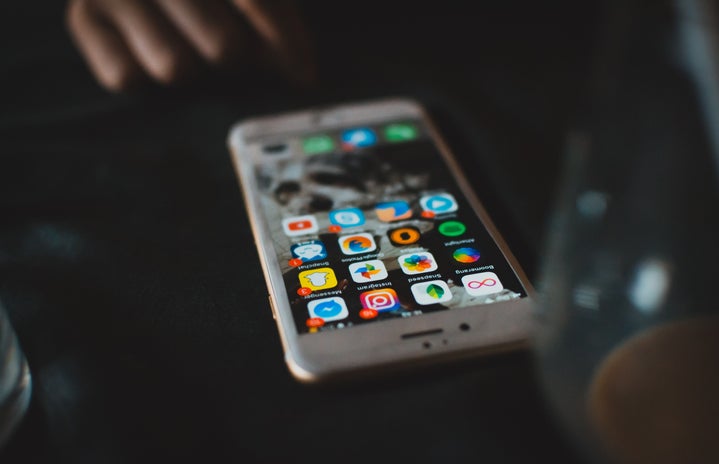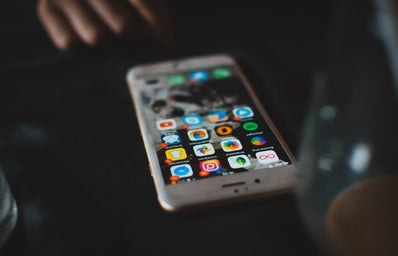I have been told by my friends and family that I am the world’s worst texter. I currently have over 100 unopened text messages as well as many more unopened Snapchats. Part of this is a result of me waiting to reply, many more messages appearing, and then I become too overwhelmed to answer any of them. However, there is a more substantial reasoning for why I do not respond to people within a matter of minutes.
Within the past few years, I have tried my best to detach myself from my phone as much as possible. I used to get so frustrated every time I was with a group of friends, and we would spend hours sitting in silence on our phones rather than having an actual conversation. I would try to initiate an activity or a topic for us to discuss, but even when they would reply to me their eyes were still glued to their screens. I know my friends did not do this with ill intent – for I even catch myself doing the same thing. Rather, they are like millions of other Americans who are unknowingly addicted to their phones.
Unplugging yourself from the online world every now and then can lead to numerous physical and mental benefits. For one, you will substantially live in the moment more. When you are consistently checking your phone, you are no longer fully present in your environment. While you may physically be there with the people you are with, your mind is somewhere else. Every time you’re in a conversation and you glance down to check your notifications, you are no longer giving someone your full attention.
However, if you set your phone down, you will notice how much more meaningful and intentional your interactions with people can be. From a work standpoint, unplugging yourself also increases efficiency. I have found myself on numerous occasions picking up my phone to avoid doing work and then getting sucked in from clicking one thing to another – not realizing how much time has passed. Without your phone as a distraction, you will finish tasks at an efficient, quick pace. You will also reduce heavy amounts of stress. With the rise of social media, there has simultaneously been a rise in anxiety and depression amongst Americans – teens especially. It provides an outlet for drama and negative comments that can leave your mind wandering even when you are not on your phone.
It can also impact your relationships and make them less authentic. We tend to scroll through people’s Instagram feeds to learn facts about them or formulate our opinions rather than meeting up with them and learning through conversation. It makes us lazy to form real life connections.
We have to remember that social media is everybody’s highlight reel – not their behind the scenes. We see everyone’s best moments online so often that we assume we are the only one’s struggling. My friends and family look happy in the pictures they are posting, so they must be doing okay, right? Sadly, this is not necessarily true, but we will never know how the people around us are doing unless we make an effort to have those authentic conversations.
While phone addiction is hard to break, seeing as we use our phones everyday for practical and impractical uses, there are little steps you can take to make it easier to unplug yourself day by day.
- Do not go on your phone when you are with people
- 86% of smartphone users check their devices while in conversations with friends and family. Be more present in your interactions!
- Do not go on your phone when having meals
- Use your daily meals as a time to detach from the online world. Watch a movie, listen to music, talk with the people around you, or learn to be comfortable with silence and enjoy your meal. This will automatically set time in your day to be off your phone.
- Pick up a new hobby
- Find something you enjoy or have always wanted to try out. Keep yourself busy and learn a new skill!
- Set a social media timer
- On average, people will spend 5 years and four months of their lifetimes on social media. Check your screen time on your phone, and see if you are comfortable with the amount of time you spend on social media. If not, consider setting a timer through your settings or an app to control how often you get distracted
- Turn off your notifications
- Set your phone on “do not disturb” every now and then. It will keep you from constantly glancing at your phone.
- If you are feeling crazy – delete your apps every now and then
- The first time I deleted Instagram to help with my addiction, I noticed how many countless times I subconsciously clicked on my social media phone folder to find the app. Deleting your apps every now and then will remove the temptation and help you recognize how often you unknowingly check your phone.
- Do not go on your phone while driving
- While you should not do this anyways because it is unsafe and can cause accidents, it amazes me how often I see people text or send Snapchats while driving. Place the quality of your life and others above a quick response #itcanwait.
- Do not charge your phone near your bed
- 87% of smartphone users check their device within an hour of going to sleep or waking up – 69% within the first or last five minutes. Try having something besides your phone be the first thing you look at in the morning and the last thing before bed. You will get better sleep, an easier time waking up in the morning, and a clearer mind.


